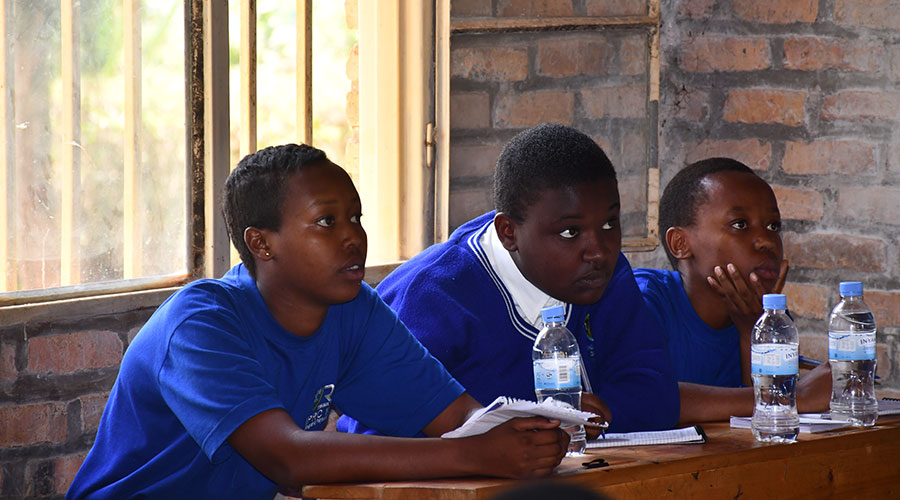

Labia elongation, also referred to as labia stretching or labia pulling, is the act of elongating the labia minora through manipulation or pulling.
It is a known cultural practice in some African countries such as Rwanda, Burundi, Zambia, Uganda, Malawi, and Zimbabwe. The cultural practice of labia elongation (Gukuna) imposed on female children and women in some African societies has been classified by World Health Organization (WHO) as a harmful practice that violates human rights.
In a conversation on labia elongation while reflecting on its practices on child and women’s rights on the national TV last weekend, activists pointed the need to end this practice since it violates the rights of women and the girl child.
"Children are being forced to undergo this harmful process, and as a society, we need to stop this. The process itself is painful, she added "the pulling goes with pain, irritations and risks of wounds that cause discomfort.” said Juliette Karitanyi, Director of Communications at Health Development Initiative (HDI).
On one hand, some regard this as a factor to enhance sexual pleasure for partners and to aid in child delivery, and some women regard these practices as beneficial in their lives. However, other women regard this practice as unnecessary, since sexual pleasure is a matter of mutual interest and enjoyment of specific sexual behaviours and practices that varies from one individual to another.
Dusangire Ambroise, a social media user said "labia elongation improves hygiene and increases sexual pleasure, it is more enjoyable for men. Otherwise this is a tradition that women and girls need to hold on to. I can spot the difference between the woman who did it and the one who did not do it during sex intercourse. The sensation is different.”
However, Dr Magnifique Irakoze, gynaecologist said; "sexual pleasure is a physiologic response to a set of activity, both physical and mental stimulation, that leads to hormonal secretion which creates the arousal that can trigger orgasm. Sexual pleasure is subjective, which means it is not quantified, and sexual feelings are perceived differently.”
"The process of child delivery is mainly about the baby’s passage from the uterus and having the strength to push the baby out. Labia elongation does not play any role in child delivery,” he added.
According to a research done by Koster and Price in 2008, men and women view the practice of labia elongation as a factor of beauty that also allows them to experience greater sexual pleasure. It is further viewed as an act of socialisation that helps Rwandan women identify with their cultural heritage.
Karitanyi says the practice is a complex issue, which needs more open conversation to solve.
Campaigns against this kind, especially at the family level and in boarding schools, need to be created just as we do for teen pregnancy.
She said currently, it brings shame to both those who have elongated and those who didn’t. Social norms are a major factor that contribute to gender inequality,” she said.
"Labia elongation is irreversible. Women should instead question the motives behind wanting to elongate their labia since we know the practice is rooted in a patriarchal system. We can’t dream of achieving gender equality in every realm of our lives and yet force women to change their bodies in order to please men,” Karitanyi added.
Activists have stressed the importance of protecting young girls from this harmful practice and enabling women to live in a society free from societal norms that force them to live a life of pleasing men.
Irakoze pointed out the need of being informed before engaging in the practice for women above the age of consent.
"Labia elongation may cause infertility caused by infections. One of the reported complications is irritation that might result in a small wound at the vulva, these can be points of entry of infection. If someone delays to consult, the infection might ascend and attack the internal female organs including the tubes and ovary. Those untreated Chronic Pelvic inflammatory diseases cause infertility for a woman. If women choose to do it, let them do it in a setting with proper hygiene and a good medical environment” he added.
"We can’t even talk about ‘free choice’ because that’s totally ignoring the hardcore power dynamics at play at every level of society, the systemic subordination of women and girls, teaching girls to do what they’re told and not ask questions, and value the validation of boys and men’s attention above all else.” Katie Carlson, Gender specialist said
"Choice is a scam, because what is choice when the alternative is not accepted by society? If we are constantly told marriage is what validates a woman then she will do all she can to fit in. We also need our government to take a stand on the issue. We need research, we need the acknowledgment of gukuna as a practice that is still being taught through formal and informal institutions to young girls and women,” feminist Olive Uwamariya added.
"We need to keep the conversation going, raising more awareness on the issues by organizing radio and TV shows as well as social media campaigns on the consequences of labia elongation from the health, cultural and rights perspectives.” Redempter Batete, a gender activist said.
Karitanyi said HDI plans to conduct a research in order to understand the magnitude of the practice and the current practice to the girl child and the pressure it poses on women. The organization is also planning to carry out advocacy to ensure safety and the protection of the girl child.


